Freeland hints at potential interest-rate cut amid falling inflation

Inflation has declined to its lowest point in three years, setting the stage for the Bank of Canada to potentially cut interest rates when it meets next week on June 5.
Deputy Prime Minister Chrystia Freeland made this statement, as reported by the Financial Post.
“We, the government, as the part of the Canadian financial system in charge of federal fiscal policy, have been very mindful of acting in such a way that would create conditions that support the decline in inflation, that support creating conditions that would make it possible for the Bank (of Canada) to act to bring interest rates down,” Freeland said on Tuesday while providing an update on the federal government’s economic plan.
When asked if declining inflation and other factors support a rate cut, Freeland acknowledged the significance of the issue, noting that it “touches the central preoccupation” of many Canadians.
She highlighted that for four consecutive months, inflation has remained within the Bank of Canada’s target range, with the latest figure showing inflation at 2.7 percent in April—the lowest in three years. “That is real progress,” she stated.
Freeland also pointed out that central bank governor Tiff Macklem had praised the federal fiscal policies outlined in the fall economic statement and the latest federal budget as beneficial. “We’ve been conscious of our side of things,” she added.
However, Freeland refrained from directly advising the Bank of Canada to cut rates, emphasizing the independence of the central bank, which she said, “has served us well.”
During the press conference, which also included Industry Minister François-Philippe Champagne and Anita Anand, president of the Treasury Board, other issues were addressed, such as tax incentives from the budget and foreign investments in Canada.
Freeland also discussed Joe Biden’s recent announcement of tariffs against China, including key parts of the electric-vehicle supply chain. This topic was prominent during her visit to Italy for a meeting of G7 finance ministers and central bank governors.
She noted that Champagne has been using the Investment Canada Act to screen Chinese investments that might harm Canada’s economy. Canada has “tariffs” in place against China and will monitor the situation to prevent Canada from becoming a conduit for Chinese products entering the United States.
Freeland criticized China for its “intentional, state-directed economic policy, which is leading to overcapacity and oversupply in specific sectors,” such as aluminum, steel, critical minerals, and other manufacturing sectors.
“That is not playing by the rules,” she said, adding, “and at a time when it is so important for us in Canada to be supporting this industrial transformation, we cannot let Canadian industry be wiped out by Chinese oversupply and overcapacity.”



